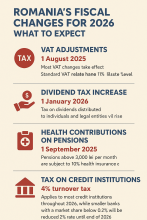The 1% tax rate for micro enterprises in Romania: a game changer for 2026
Submitted by frjacobs on Fri, 01/30/2026 - 13:30The landscape for small businesses in Romania is set to undergo a significant transformation in 2026 with the introduction of a new tax regime. This change, particularly the implementation of a 1% tax rate for micro enterprises, presents a unique opportunity for entrepreneurs looking to establish or expand their businesses in this vibrant market. This article delves into the implications of this new tax structure, the eligibility criteria, and the broader context of Romania's evolving business environment.










